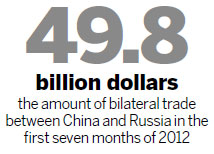
Trade settlement in national currencies between China and Russia will increase substantially starting in 2013, though there was no notable rise this year, a senior executive of Russia's largest commercial lender by assets said on Wednesday.
"We are in discussions with eight major Chinese banks to set up an efficient infrastructure system to conduct settlement in roubles and yuan, and we hope to greatly expand the amount of such settlements in three to five years," Sberbank Deputy Chairman Andrey Donskikh said in Beijing.
Donskikh told China Daily that the settlement amount in 2012 is likely to remain similar to last year's, which was less than $1 billion.
"That means huge development potential lies ahead, given that bilateral trade should reach $90 billion by this year-end."
Sberbank is trying to work out an arrangement with major Chinese lenders to extend credit to each other so that both have enough reserves for the other's currency.
The eight Chinese banks are Industrial and Commercial Bank of China Ltd, China Construction Bank Corp, Agricultural Bank of China Ltd, Bank of China Ltd, Bank of Communications Ltd, China Merchants Bank Co Ltd, China Development Bank Corp and Export-Import Bank of China.
"We tried to draw a roadmap on how to better facilitate such settlements, and we discussed how to manage each other's currency in the domestic foreign exchange market."
Last year, Sberbank executives said they hoped Chinese banks would provide them more than $200 million in credit for trade finance and extend the period of validity to more than five years.
"Long-term" and "multilateral" cooperation with Chinese financial institutions is a key part of Sberbank's international strategy, Donskikh said.
In August 2010, it set up a representative office in Beijing. It is now preparing to submit an application to upgrade that office into a branch by the end of 2013 or early 2014.
The branch would focus mainly on trade settlement and financing services and provide consultation services to businesses from both countries, Donskikh said. He added that Sberbank is also in discussions with Chinese partner banks to cooperate on the development of debt and financing tools.
China was Russia's top trade partner in the first seven months of 2012, the Russian Federal Customs Service said in September. Bilateral trade volume reached $49.8 billion, it said, and trade between the two countries increased 10.9 percent year-on-year.
Last year, the trade volume between the two countries stood at $84 billion, up by 41 percent year-on-year.
The large scale of bilateral trade presents a wide range of opportunities for Sberbank to work with major Chinese banks to improve settlement services for customers in roubles and yuan and promote trade finance transactions, Donskikh said.
In June 2011, the leaders of the two countries announced plans to expand Sino-Russian trade to $100 billion by 2015 and $200 billion by 2020.
Growth potential can also be seen in project finance, investment banking and transactions in global capital markets, he said.
Cooperation with Chinese banks is a core objective for Sberbank, and profits generated from that cooperation are expected to increase tenfold in the next few years, Donskikh said.
"Internationally, Russia and China are strategic partners, and, at a time when the world is feeling the impact of political and economic crisis, the successful cooperation of Sberbank with China's major banks illustrates the positive effect of joint efforts between Russia and China."
Sberbank accounted for 27 percent of Russia's total banking assets and 26 percent of its banking capital in 2011. The Russian central bank holds 50 percent of its shares, after selling 7.6 percent to other investors in September.
Media reported in June that China Investment Corp, which manages the country's $410 billion sovereign fund, was invited to purchase up to 5 percent of Sberbank's shares, which were valued at around $3.8 billion.
Donskikh declined to comment on whether CIC made the purchase, but he said no single institution bought a big proportion of the shares.
He also denied that CIC was the only Chinese institution showing interest in Sberbank shares.
Trade settlement in national currencies with Russia has huge growth potential because settlement in yuan accounts for less than 5 percent of the total trade volume between the countries, Jin Mei, deputy director-general of the currency policy division at the People's Bank of China, said at the end of last year.
The rouble is still the most-used currency in trade settlement in national currencies between China and Russia, she said.
